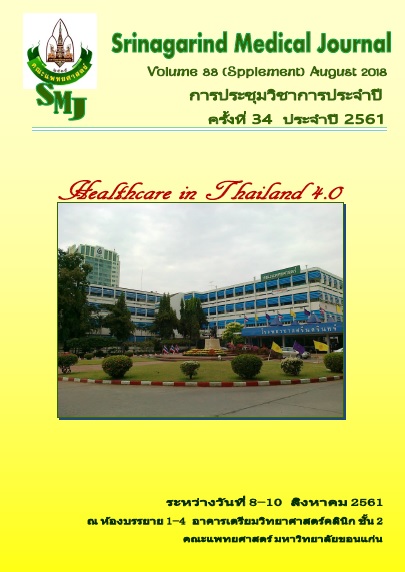Proportion of Cancer Patients’ Caregivers Who Have Stress and Stress-Related Factors: A Study in Caregivers of Chemotherapeutic-Treated Cancer Patients in Srinagarind Hospital
Keywords:
ความเครียด; ปัจจัยเกี่ยวข้องกับภาวะเครียด; ผู้ดูแลผู้ป่วย มะเร็งAbstract
Background and objectives: Cancer is a chronic and poorly prognostic disease, resulted in stress in both patients and caregivers. This study aimed to determine the proportion of caregivers of chemotherapeutic-treated cancer patients who have stress and stress-related factors.
Methods: Study design was cross-sectional descriptive, and conducted in caregivers of chemotherapeutic-treated cancer patients in Srinagarind Hospital, Khon Kaen University. One-hundred and nineteen caregivers were randomly sampled using time frame as a sampling unit. Self-administered questionnaires were used. The questionnaires included the Caregiver Strain Index (Thai translated version) for stress determination and newly developed questionnaires for stress-related factors study. Statistical analyses were included percentage, 95% confidence interval, Chi-square and multiple logistic regression.
Results: The response rate was 100 percent. The prevalence of stress among caregivers were 37.8 (45/119), 95% CI: 29.09-46.51. The risk factors were; work-related problems [Adjusted Odds Ratio (AOR): 3.59 (95% CI: 1.23-10.53), p = 0.020], and self-payment [AOR: 12.47 (95% CI: 1.05-148.20), p = 0.046]. The protective factor was sufficient income [AOR: 0.30 (95% CI: 0.11-0.83), p = 0.021].
Conclusion: One third of caregivers of cancer patients have stress. The risk group of caregivers should be promoted for mental health education or received stress-relieving service during staying in a hospital.
References
Downloads
Published
How to Cite
Issue
Section
License

This work is licensed under a Creative Commons Attribution-NonCommercial-NoDerivatives 4.0 International License.




